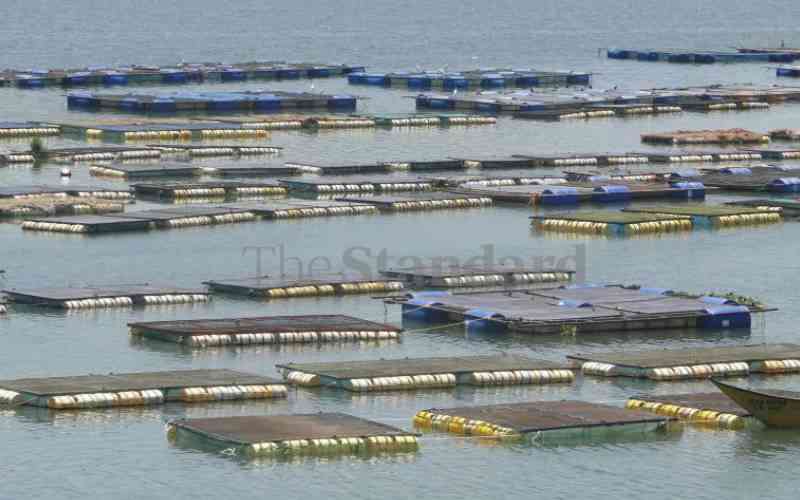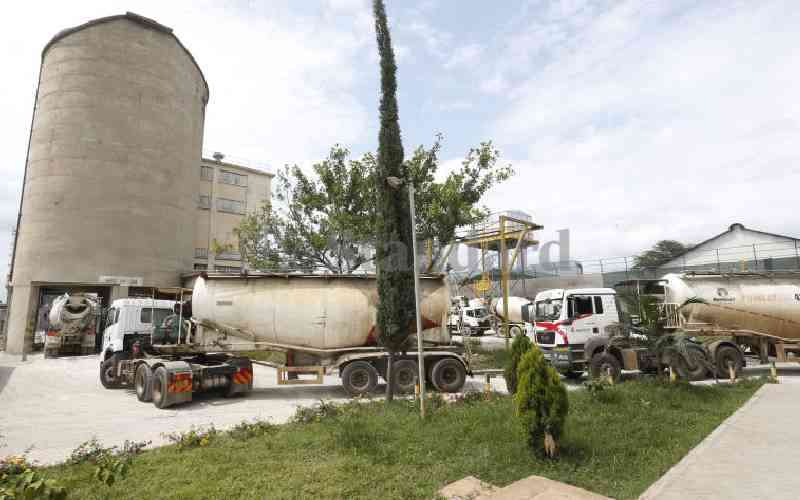
For more than eight years, cage fish farming has turned into a thriving business churning out millions in income for farmers and increasing production in the wake of dwindling stocks in natural waters.
Besides conserving wild fish stocks, fish cage farming is also a new socioeconomic frontier with good prospects for income in Lake Victoria. Currently, fish cage farming is practiced in five riparian counties of Siaya, Homa Bay, Kisumu, Busia and Migori.
Even though the fish cages have become popular due to their flexibility in placement, ease of expansion and high return on investment, there are concerns over looming conflict over competition for the lake space.
There are fears several beaches and landing sites in Nyanza are losing their flair and areas of operations as ambitious cage fish farmers increase the number of fish cages in the lake.
Data at Kenya Marine and Fisheries Research Institute (KMFRI) indicates there are over 6,000 fish cages on the Kenyan portion of Lake Victoria. Each cage has the capacity to produce one tonne of fish annually.
Clifford Omollo, a fisherman, says the new technology has come with its share of challenges and is threatening the local fishing industry.
"Fish cage farming was a good idea and it has helped in addressing dwindling fish stocks in the lake, but on the other side, it is pushing traditional fishermen out of the lake," he said.
Omollo, a fisherman in Rarieda sub-county, says he has not been able to fish in areas where the cages have been installed.
"We have fishermen who are not able to afford the cages and rely on wild stocks. Give that there are no regulations, the lake is free for all and soon, these fishermen will have no place to fish," he said.
72-year-old Peter Oluoch, a former fisherman looks back at the lake more than two decades ago and fears for the worst.
Oluoch says since the cages have been installed in areas that had been earmarked as fish breeding zones, the socioeconomic impact will be huge.
"Other than destroying the fish breeding zones, the cages are also limiting our waterways' mobility and fishing routes in the lake," he said.
Oluoch said with the impending risk factors, the cages will end up taking over the lake to what he terms as privatisation.
"If no regulations on where the cages should be put and the number of cages an individual should own, then most fishermen will not be able to access the lake," he said.
For Henry Oyamo, another fisherman in Honge beach, fishing in deep waters requires a lot of resources and many fishermen operate near the shores.

"Our places for fishing have been invaded by fish cage owners and this only helps some few individuals," said Oyamo.
While fish cage farming has been touted as a source of employment for many people, Oyamo disagrees, arguing that the traditional fishing systems employ a lot of people.
"For traditional fishing, you'll find more than ten people benefiting from a single boat as opposed to fish cage farming where there are less than five people," said Oyamo.
An investigation by The Saturday Standard in Usenge and Luanda Kotieno has established how the worrying developments are threatening the existence of traditional fishermen.
A number of fishermen interviewed said the fish cage technology was collapsing most of the fish landing sites.
Julius Odembo, chairman of Sika Beach Management Unit said cages are owned by investors who only report to the beaches once but are not taking care of the concerns in the beaches.
"Most of the time, the cage owners always harvest but don't land at the beaches. This is greatly affecting the existence of these beaches," said Odembo.
Odembo further argued that they are not able to get records on the production from the cages because the owners do not land at the designated beaches.
According to Dr Chrisphine Nyamweya, a director at Kenya Marine and Fisheries Research Institute (KMFRI), rising fish cage culture as forms of investment leads to environmental degradation besides threatening natural fish production in the lake.
"The cage culture is growing rapidly and will soon overtake the wild and natural fish production in the lake," said Dr Nyamweya.
He said the space for natural products is shrinking at an alarming rate, meaning fish cage farming will eventually take over the lake.
KMFRI data shows that species like Tilapia have already shrunk by more than 50 per cent in the last decade but the resilient Nile perch shrunk by 23 per cent.
While the county and national governments have been advocating for aquaculture, local fishermen say most of the programmes have not been benefitting them.
"When you give subsidised fingerlings and fish feeds to farmers, it is beneficial to individuals and not that poor fisherman who would like to improve his life," said Michael Owiti, a local fisherman.
According to Owiti, there is a need to review most of the programmes targeting fishermen for the purposes of improving the fisheries industry.
The Siaya County Fisheries and Aquaculture Bill 2016 that is yet to become law, aims to address some of the issues that the fishermen have raised.
The Bill was to demarcate fish breeding areas, promoting cooperation among fishers as well as providing for the establishment of investor-friendly licensing and approval systems.
Another fisherman, Moses Ouma, says another factor that is slowly killing most of the landing sites is the harassment and arbitrary arrests by Ugandan authorities over alleged trespassing and use of illegal gears.
"After being driven out of the lake by Ugandans, our fishermen will have nowhere to fish because the lake space will be filled with cages," says Ouma.
 The Standard Group Plc is a multi-media organization with investments in media platforms spanning newspaper print
operations, television, radio broadcasting, digital and online services. The Standard Group is recognized as a
leading multi-media house in Kenya with a key influence in matters of national and international interest.
The Standard Group Plc is a multi-media organization with investments in media platforms spanning newspaper print
operations, television, radio broadcasting, digital and online services. The Standard Group is recognized as a
leading multi-media house in Kenya with a key influence in matters of national and international interest.











